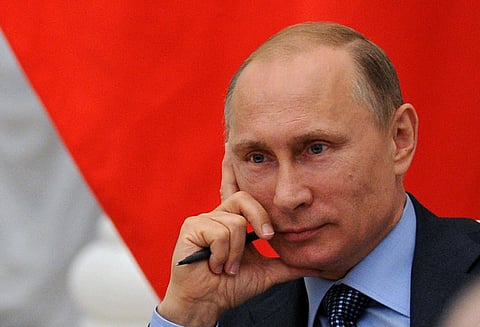Putin’s choices are fast diminishing
Any attempt on Moscow’s part to escalate things is bound to translate into painful sanctions from the West, besides alienating Ukrainians further

More than three months have passed since Vladimir Putin’s triumphalist speech to the Russian parliament. In it, he exulted in his military seizure of Crimea while basking in an orgy of chauvinistic sentiment. Putin clearly relished the enthusiasm and apparently gave little thought to the larger, longer-term strategic consequences of what he unleashed.
Three months later, amid continuing uncertainty regarding the future of Russo-Ukrainian relations, as well as growing international costs for Russia, Putin faces three basic choices:
1. He could pursue an accommodation with Ukraine by terminating the assault on its sovereignty and economic well-being. This would require wisdom and persistence from Russia as well as Ukraine and the West. Such an accommodation should involve the termination of Russian efforts to destabilise Ukraine from within, ending any threat of a larger invasion, and some sort of East-West understanding that entails Russia’s tacit acceptance of Ukraine’s prolonged journey towards eventual European Union membership. At the same time, it should be made clear that Ukraine does not seek, and the West does not contemplate, Ukrainian membership in Nato. It is reasonable for Russia to feel uncomfortable about that prospect.
Additionally, it would likewise be made clear that Russia no longer expects Ukraine to become part of the “Eurasian Union,” which is a transparent cover for the re-creation of something approximating the former Soviet Union or Tsarist empire. This should not preclude, however, a Russian-Ukrainian trade deal, since both countries can benefit from increasingly cooperative trade as well as financial relations.
The international community could reiterate its support for that outcome and the resumption of more normal relations with Russia itself, including the lifting of sanctions.
2. Putin could continue to sponsor a thinly veiled military intervention designed to disrupt life in portions of Ukraine. Should Russia continue on this course, obviously the West would have to undertake a prolonged and truly punishing application of sanctions designed to convey to Russia the painful consequences of its violation of Ukraine’s sovereignty.
This unfortunate outcome would likely yield two basket cases in Eastern Europe: Ukraine, because of destructive Russian actions, and Russia itself.
3. Putin could invade Ukraine, exploiting Russia’s much larger military potential. Such an action, however, would not only prompt retaliation by the West but also could provoke Ukrainian resistance. If such resistance were sustained and intense, there would be growing pressure on the members of Nato to support the Ukrainians in a variety of forms, making the conflict much costlier to the aggressor.
For the Kremlin, the consequence of this third option would be not only a permanently hostile Ukrainian population of more than 40 million but also an economically and politically isolated Russia facing the growing possibility of internal unrest.
The obviously correct choice is to find a formula for accommodation, which must involve the abandonment of the use of force against Ukraine by Russia. The issue of Crimea will remain unresolved for now, but it will serve as an enduring reminder that chauvinistic fanaticism is not the best point of departure for resolving complex issues. This is why Putin’s actions are a threat not only to the West but, ultimately, also to Russia itself.
— Washington Post
The writer was national security adviser from 1977 to 1981. This commentary was adapted from testimony he is scheduled to deliver to the Senate Foreign Relations Committee this week.
Sign up for the Daily Briefing
Get the latest news and updates straight to your inbox



